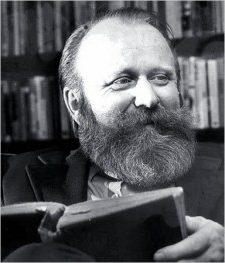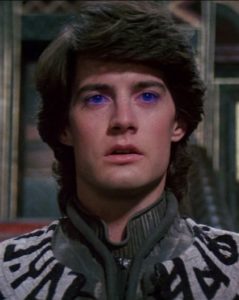
Frank Herbert, master of Science Fiction (not just Dune) and looking particularly jubilant there, too. He was a resident of the central Oregon Coast. (I told you he was smart!)
This is taken from Frank Herbert’s magnificent Dune series, specifically The Children of Dune [the third of six books]. The story and the series have never yet been done properly in video, perhaps never will be. Frankly, the work is too broad, too deep and too all encompassing as a commentary on Humanity, Empire Culture, Planned Evolution vs Natural, complex systems, Ecology, the Limits of Human Ability, styles and kinds of Leadership, the Abuses of Ego, the Sacrifices(1) of real service, and so on. It would be hard to do the series justice in anything less than 20 hours of tightly written, passionately well directed, brilliantly acted and sharply edited video, dedicated to nothing more nor less than broadcasting Mr. Herbert’s incredible and incredibly apt (increasingly so, as this weird 21st Century unfolds) message(2).

If you’ve only seen the movies or the mini-series, then the character Muad’dib is *not* what you think he is. Not by a long, long way.
Anyway… here’s the quote. It’s addressed to that which in the Empire can be taken as the core of business and business profits(3).
What you … seem unable to understand is that you seldom find real loyalties in commerce. When did you last hear of a clerk giving his life for the company? Perhaps your deficiency rests in the false assumption that you can order men to think and cooperate(4). This has been a failure of everything from religions to general staffs throughout history. General staffs have a long record of destroying their own nations. As to religions, I recommend a rereading of Thomas Aquinas(5). As to you of [the Corporate Attitude], what nonsense you believe! Men must want to do things out their own innermost drives. People, not commercial organizations or chains of command, are what make great civilizations work. Every civilization depends upon the quality of the individuals it produces. If you over-organize humans, over-legalize them, suppress their urge to greatness — they cannot work and their civilization collapses.
~ Frank Herbert,
writing as the Preacher (aka, Muad’dib)
[30]
(1) The word “sacrifice” is actually quite astonishing. Comes from Latin sacer + facere which gives it the meaning of “to make Holy” or “to make Sacred.” Wow. I say again, “Wow!!”
(2) By the way, Dune started out in Mr. Herbert’s mind (as I understand it) as an attempt to get people to understand the intricacies and fragility of Ecosystems. It was written in the early days of mass awareness of how we’re damaging our own and irreplaceable Living Room. Naturally the story encompasses dozens of other concepts and themes as well. It’s really a treatise on the nature of Human Government and how Empire Culture can never really be stable nor ensure a lasting future for the Human species, and on what *might* be a better system.
(3) That is, CHOAM: a multi-planet organization that controls all trade and commerce and exemplifies the pitfalls of such organizations everywhere. NAFTA, the East India Trading Company, etc…
(4) Is that not the typical fallacy of nearly every government and legal system everywhere? Are not laws mostly an attempt to regulate human action, if not thought? By the way, there *is* a proper way to achieve the desired results: the current mainstream, global-wide tyrannical, legal and bureaucratic systems are not it, though. But that’s another tale.
 (5) In case you don’t know, and some of you don’t (no worries), Thomas Aquinas was a real character in (shall we say?) Earth’s early history, pre-space colonization (“Dune” being set some 20,000 years in the future, fer Gos’akes). Thomas Aquinas was an Italian Dominican friar, philosopher, Catholic priest, and Doctor of the Church. An immensely influential philosopher, theologian, and jurist in the tradition of scholasticism, he is also known within the latter as the Doctor Angelicus, the Doctor Communis, and the Doctor Universalis [preceding is borrowed with permission from Wikipedia]. He is also known as Saint Thomas Aquinas. So there…
(5) In case you don’t know, and some of you don’t (no worries), Thomas Aquinas was a real character in (shall we say?) Earth’s early history, pre-space colonization (“Dune” being set some 20,000 years in the future, fer Gos’akes). Thomas Aquinas was an Italian Dominican friar, philosopher, Catholic priest, and Doctor of the Church. An immensely influential philosopher, theologian, and jurist in the tradition of scholasticism, he is also known within the latter as the Doctor Angelicus, the Doctor Communis, and the Doctor Universalis [preceding is borrowed with permission from Wikipedia]. He is also known as Saint Thomas Aquinas. So there…